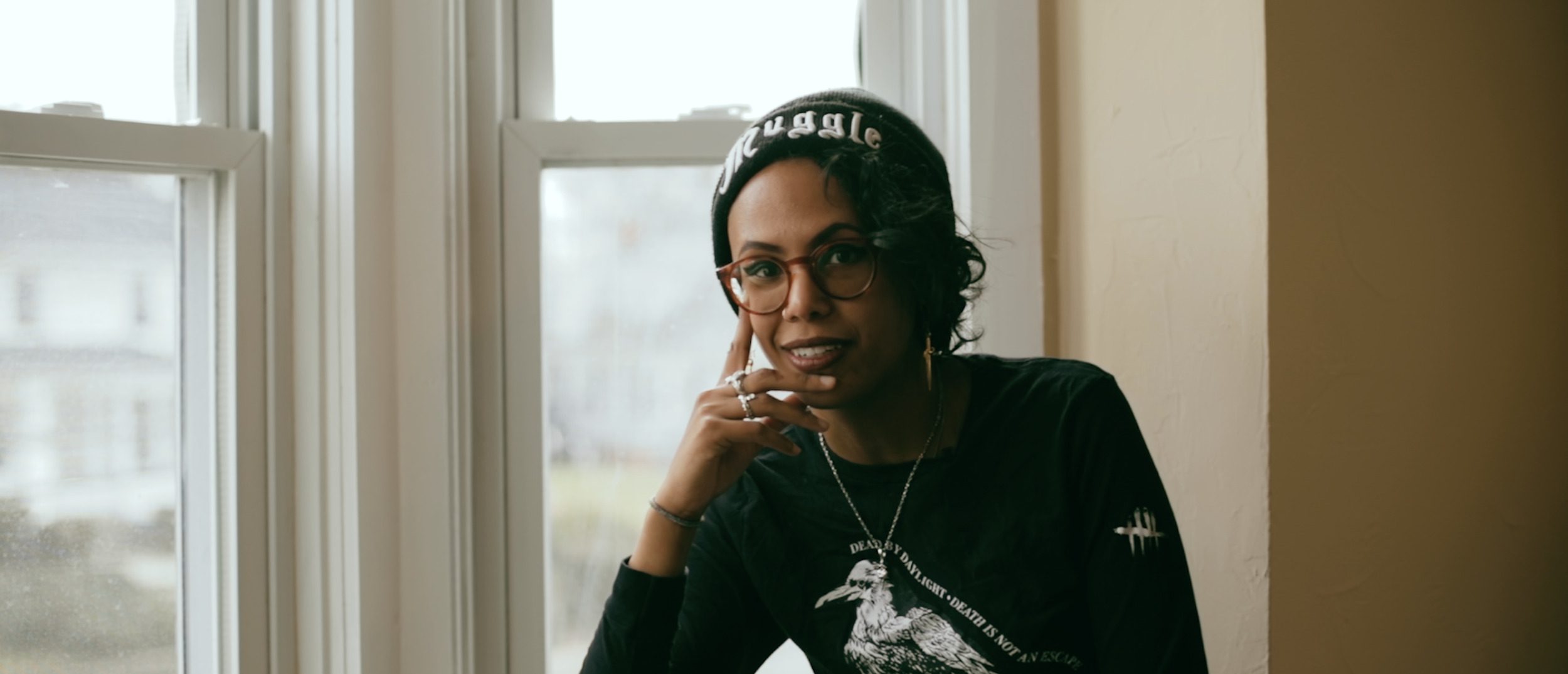REVIEW: Gothix (2023)
The streamer Gothix has been making the rounds lately as the Black Girl Gamers story grows and their practices are discussed. But she’s been around for a while, and she’s had a tumultuous journey since starting her online streaming career. She even has a documentary, titled Gothix, about her evolution from gamer to sociopolitical commentator and the rough road she traveled as she experienced cancel culture firsthand. Admittedly, I initially wondered what Gothix, whose real name is Vanessa Lopez, could say in a feature-length documentary that she didn’t in a thirty-minute video, but Gothix is much more than a simple rundown of her history (and it doesn’t mention Black Girl Gamers); it’s a human tragedy that gets under your skin and makes you feel all the things she did before she built herself up again.
The first eighteen minutes and change of Gothix show how she got into streaming as a hobby and, eventually, as a job, and this section is crucial to the doc. First, it demonstrates how liberating this is as a profession for gamers. Gothix is honest about the pitfalls – the income is inconsistent, the bottom could fall out at any time – but the joy she feels at being able to make a living from her passion is palpable. It’s a great American story of betting on yourself because something inside tells you that you have to try, and there are plenty of those stories out there now. (This doesn’t mean only Americans can do it, just that there is something in the American Spirit that ignites that drive.) And Gothix’s joy and tears feel genuine as she recounts her journey to streaming, which is probably why she got so popular. This is also why watching Gothix is much more satisfying than just hearing her story; you experience it with her.
The other reason it’s important is because it’s a reminder of how much fun this used to be. Playing video games, whether for pleasure or money, should be enjoyable, not bogged down in social issues or political discourse. It’s about pressing a button and hearing doink noises while a plumber punches a glowing block or shooting hordes of bad guys, and all things in between. That’s what Gothix signed up for when she started: experiencing that joy and making money by sharing it with others. There are clips of her work in the film, like making silly graphics with her face in videos (I’m sure there’s a technical name for this that I don’t know) or having fun with her audience, and it’s clear how much of a blast this was for her and her viewers. It makes what happens next so much sadder and puts into perspective how soul-sucking the gaming world has become.

Things changed for Gothix when she joined The Cookout, a “community” of Twitch users dedicated to giving black streamers a place where they could interact and support each other’s growing channels. Gothix joined them, believing the sales pitch that it was hard for a black streamer to grow their channels independently. And things were great… for about six months. That was when Gothix voiced her opinion on Disney’s live-action remake of The Little Mermaid – or, more accurately, her opinion that people weren’t racist for disliking the new version. She received vitriolic responses from many of her new Cookout friends filled with racial slurs and insults, like being called “anti-black” and accusations of pandering to a white audience. And it went beyond messages on then-Twitter; people entered her streaming chats to try to drive away her audience. Gothix lost subscribers to the point where she had to abandon streaming for emotional and psychological reasons, a well as dwindling finances; in other words, she was canceled.
It’s difficult to watch this section of the doc, but it puts the concept of canceling a person into perspective. Gothix is not just sad because of what’s happening to her; she’s struggling to understand why. She doesn’t understand what she did to get that reaction from people she thought were her friends or why saying we should take a minute and consider things before labeling another person a racist is such a bad thing. This is the effect of cancel culture on the individual; it’s dehumanizing, scary, and makes you question yourself and your values. Gothix came at the issue from a place of understanding rather than hate, and she had hate directed at her from the people who offered her a “safe space.” The irony of people who wanted her to call others racist using every racist term in the book when attacking her was apparently lost on them, but it wasn’t on Gothix – nor was the fact that these were people she considered friends, people whose channels she’d help build. It’s scary and infuriating.

And that’s what makes Gothix such a good documentary. You feel every step of Gothix’s ordeal in a way that, if it hasn’t happened to you, you otherwise couldn’t. Her downward spiral, which took her from anti-depressants to taking destructive physical risks and even worse measures, gets under your skin because she takes you through it via interviews and old video footage. And it isn’t just her streaming history; Gothix talks about her family, shifts in her political views, and how she even did some of the things her betrayers did to her. She’s very candid about her own shortcomings, and it not only further humanizes Gothix but illustrates how being part of a toxic subculture can rub off on anyone, even those with the best intentions. It’s a human and relatable story, one well worth watching for anyone who’s seen these cancellations and mob attacks happen.
There’s plenty more to experience in Gothix. I haven’t touched on the George Floyd riots, Thomas Sowell, Eric July, rebranding, Black lives Matter, more cancellation attempts, religion, and how McDonald’s can teach you a lot about humanity. It’s a gripping story, at turns depressing and uplifting, and while Gothix seems like she’s in a good place now, I can’t help but be saddened that she’s lost the fun she started with and the world she fell into took from her. Gothix will make you feel for the canceled in a way articles or testimonials can’t.
You can watch Gothix on the streaming service Loor, and you can follow Gothix on YouTube, Rumble, Twitch, and X, and visit her website.
Gothix (2023)
Educational Value - 8
Entertainment Value - 9
Directing/Editing - 9
Objectivity/Fairness - 9
Breadth of Research - 8
8.6
Great
Gothix is a gripping documentary that puts a human face on cancel culture and demonstrates Gothix's triumph over adversity and transformation from gamer to activist.
Comments (1)









She’s a godsend and exactly the kind of person we need more of, an insider that goes public with their own personal odyssey story. It reminds me of the book Radical Son by David Horowitz, who worked with leftist, communist and marxist organizations his whole life and then, wrote about it all. I’m a fan of Anthony Brian Logan and he said the same thing, that he came from a Black Nationalist background, at least at time. Don’t know for how many years. It comes from a Point of view of someone who was down for the cause, but jaded. Also, shows how much cult activity and gang mentality plays a role of making people become NPCs, instead of actually progressing in their own individual lives.
A wee bit off topic to Gothix and BGG, but you kind of see this right now in women’s basketball where the WNBA does not want Caitlin Clark due to her race, even if it means bringing in ratings, fans and money for everyone. It’s one thing you can say about the old days that the West absolutely tried the inclusion thing, but the more they included and became diverse, the more discriminatory things got.